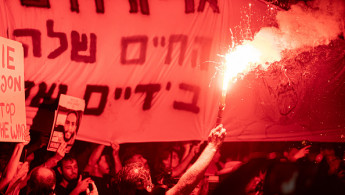Israeli protesters demanding end to Gaza war clash with police
Scuffles between Israeli police and protesters erupted in Tel Aviv on Saturday after thousands gathered to demonstrate against the government and demand that it bring back the captives being held by Hamas in Gaza.
Meanwhile, a small U.S. military vessel and what appeared to be a strip of docking area washed up on a beach near the southern Israeli city of Ashdod, not far from the U.S.-built pier on which the Israeli military said humanitarian aid is moving into the Palestinian territory.
Also on Saturday, Israeli bombardments were reported in northern and central Gaza.
Some protesters in Tel Aviv carried photos of the female soldiers who appeared in a video earlier in the week. Some held banners reading “Stop the war” and “Help.” They called on the government to reach a deal to release the dozens of hostages still in captivity.
The protesters also called for the resignation of Israeli Prime Minister Benjamin Netanyahu and demanded new elections.
“We all saw the video, we could not stay at home after the government abandoned all these people,” said Hilit Sagi, from the group “Women Protest for the Return of All Hostages.”
Divisions among Israelis have deepened over how Netanyahu has handled Israel's war on Gaza.
“Basically they are not doing enough in order for the hostages to come back, either with military force, with (a) hostages’ deal, negotiating. Nothing is being done,” said Snir Dahan, uncle of hostage Carmel Gat, still in captivity in Gaza.
#BREAKING: Thousands of Israeli citizens come out on the streets of Tel Aviv demanding resignation of Israel Prime Minister Benjamin Netanyahu, early elections and swap deal to release the remaining hostages with Hamas in Gaza. Minor clashes between civilians and police reported. pic.twitter.com/CrNpdLNozw
— Aditya Raj Kaul (@AdityaRajKaul) May 25, 2024
Earlier in the week, the bodies of three captives killed were recovered from Gaza, Israel’s army said Friday.
Around half of the 250 captives taken by Hamas and other militants have been freed, most in swaps for Palestinian prisoners held by Israel during a weeklong cease-fire in November.
Netanyahu’s government has faced increasing pressure, both at home and abroad, to stop the war and allow humanitarian aid into the enclave that is home to 2.3 million Palestinians, almost 80% of whom have been displaced.





 Follow the Middle East's top stories in English at The New Arab on Google News
Follow the Middle East's top stories in English at The New Arab on Google News
![The UAE is widely suspected of arming the RSF militia [Getty]](/sites/default/files/styles/image_330x185/public/2024-11/GettyImages-472529908.jpg?h=69f2b9d0&itok=Yauw3YTG)
![Netanyahu furiously denounced the ICC [Getty]](/sites/default/files/styles/image_330x185/public/2024-11/GettyImages-2169352575.jpg?h=199d8c1f&itok=-vRiruf5)
![Both Hamas and the Palestinian Authority welcomed the ICC arrest warrants [Getty]](/sites/default/files/styles/image_330x185/public/2024-11/GettyImages-2178351173.jpg?h=199d8c1f&itok=TV858iVg)